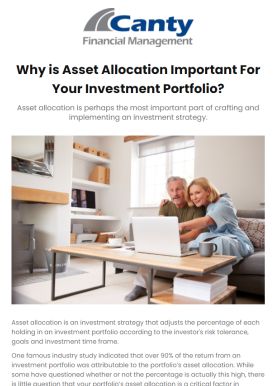
Hiring a financial advisor is an important decision. Whether this is your first relationship with a financial advisor, or you are replacing an advisor who is no longer right for your needs, it's important to do all you can to ensure that you are hiring the best financial advisor for your situation. Asking the right questions is a critical part of the process. Here are some questions to consider asking a prospective financial advisor.
It’s important to understand your advisor’s qualifications and experience. How long have they been in the business? What is their educational background? Do they have any professional designations such as the CFP® certificate, a CPA designation, have they passed any parts of the CFA exam or do they have an MBA? These are similar questions that you might ask of any professional you are considering in other areas of your life.
It’s important to understand how any financial advisor that you are considering is compensated. Fee-only advisors are compensated based on a percentage of the assets they manage for clients, via a flat-fee retainer or on an hourly or project basis. All of these compensation options are fees paid by the client.
Some advisors may be compensated by fees or commissions from products they sell. This might be from sales loads on mutual funds or annuity and insurance products. In some cases they may sell managed account services whereby your money is managed by a third-party asset manager who typically uses expensive, fee-laden investments in the managed account.
Learn more about advisor compensation and the importance of a fee-only financial advisor here.
It’s important to determine if a financial advisor that you are considering working with works with clients in similar financial and life situations as yours. This is similar to selecting a doctor. If your foot hurts you likely wouldn’t go to a dermatologist.
While financial advisors often work with a variety of clients with different planning needs, you want to be sure that you aren’t the first client they will have worked with in your particular situation. If you are a business owner looking to fund your exit strategy or perhaps a senior company executive nearing retirement, you want to be sure you select a financial advisor with experience helping clients like you.
A financial advisor who acts as a fiduciary toward their clients puts the interests of their clients first in all financial recommendations they make, period. This often aligns with an advisor’s compensation and is a reason why we have chosen to work as a fee-only advisor.
Don’t be afraid to ask any advisor you might be considering if they are a fiduciary and ask them to put that in writing for you.
Conflicts of interest often arise from how the advisor is compensated. We are not saying that advisors who are compensated as fee-based, which is generally part fees and part commissions on some product sales, do not offer solid advice. Rather compensation arrangements linked to the sale of a financial or investment product can lead to conflicts of interest where the advisor puts their financial interest above that of their clients.
Be sure to ask a prospective advisor about any and all conflicts of interest they might have in working with you as a client. Ask them to disclose these potential conflicts in writing to you.
Every client's needs are a bit different, and they may evolve over time. It’s important to know what services a financial advisor offers. Do they just do financial planning work? How about providing in-depth investment advice including managing your portfolio? On the investment side, it's important to understand the advisor’s investment process to ensure it is in line with your needs and expectations. Do they use managed accounts from a third-party firm or do they construct a portfolio from scratch based upon unique needs?
Does the advisor incorporate tax planning into the overall advice that they provide? Can they help with complex estate planning issues including business succession and others?
One thing we learned from the Bernie Madoff scandal is that it is important to know where your money is being held. Madoff acted as both the investment advisor and the custodian for his client’s assets making it easy for him to have committed the fraud that he perpetrated on his clients.
It’s important to know where your financial advisor will be housing the assets that they will be providing advice on. You will want to be sure this is an independent, third-party custodian. You also want to be sure to understand how you can view your account online and how you can access your money if needed. While this would likely be done via your advisor, it’s your money and you should be secure in the fact that you can access it when and if it's needed without any hassles or roadblocks.
If a prospective advisor tries to convince you that their private custodial services are a better option, this should raise a big red flag. We suggest that you exit any meeting with such an advisor immediately and look elsewhere for advisory services.
It’s important to ask questions of any financial advisor that you might be considering. The questions above as well as others will help give you a flavor of what it might be like to work with this advisor and their firm. If you are looking for a fee-only, fiduciary advisor we’d love to talk with you. Please give us a call to discuss your situation and how we might be of help.
Bill Canty, CFP®, CPA
Maureen Walsh, EA, Investment Advisor
Ed Canty, CFP®, Investment Advisor
Joe Canty, Investment Advisor
Tina Alteri, CPA, Tax Advisor
Ballston Spa: 518-885-3230
Naples: 239-435-0090

